Charlotta Spears Bass was the first Black woman to own and operate a newspaper. The Eagle was among the leading Black newspapers in the country, and Charlotta Bass took over management of the paper when its owner died.
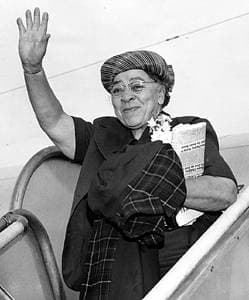
Within its pages, Bass crusaded against job and housing discrimination, police brutality, and media stereotyping. She also advocated for civil liberties, women’s rights, and immigration. Bass became one of the most influential African Americans of the early 20th century, because she galvanized national energy around civil rights.
Table of contents
Share to Google Classroom:
Lifetime Commitment to Vital Issues
From her arrival in Los Angeles until her very last years, Charlotta Spears Bass contributed greatly to the well-being of citizens in California and the U.S. Here are some of the causes she undertook:
Job Discrimination: Her campaigns against job discrimination were ongoing. The first case Bass advocated for in her newspaper was for the Los Angeles County Hospital to hire Black women. Then in the 1930s, she pushed for integration at the Southern California Telephone Company. In the 1940s, defense jobs were available. Black families moved to Los Angeles when they heard work was available. Bass and other Black newspaper publishers promoted the slogan, “Double V.” This reference was to emphasize that if Blacks helped win the wars abroad, then they should gain equality and respect at home.
Voting: In 1911 California women won the right to vote in state and local elections. Bass quickly organized women’s clubs, churches, and civil rights groups to get women registered. The California Eagle also took stands on candidates, backing those who supported equal access to restaurants, theaters, and public places.
Housing Discrimination: As African Americans began to move around the country, white people began to implement community restrictions. They stopped at very little to make Blacks feel unwelcome. In 1914, Mrs. Mary Johnson bought a small home on East 18th Street in Los Angeles. One day when she went out on some errands, the neighbors broke into her home. They moved all her furniture to the lawn and boarded up the doors and windows.
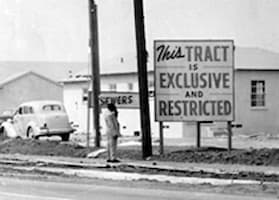
When Mary Johnson returned home, she notified Charlotta Bass. Bass rounded up one hundred church women to go to the house and stage a protest. Police eventually came and opened the home. Johnson then moved back in, shaken but knowing she was in the right.
After World War I, restrictive covenants were added to municipal laws throughout the nation. In 1942, Henry and Anna Laws were sold a home in an area that the neighbors felt barred Blacks. The Laws family was told to move out of their home, but the Laws remained and fought the issue in court. The first ruling was against them, and they were put in prison for staying in their own home. Later, that ruling was overturned.
In 1948, the Supreme Court ruled that racially restrictive covenants could not be enforced (though many still exist in legal documents today). Throughout the Laws’ fight, the Home Protection Association (funded by The California Eagle) supported them. (Also read Ossian Sweet Denied Right to His Home, 1925.)
More Causes
“Don’t Buy Where You Can’t Work” Campaign: The “Don’t Buy Where You Can’t Work” effort began in Chicago and spread to Southern California where Bass wrote about it frequently. Why should people of color shop in stores where they had to enter by a back door and were not allowed to try on merchandise? This campaign put financial pressure on discriminatory business practices I retail.
The Continuing Problem of Police Brutality and White Supremacy: While brutality and white supremacy could erupt anywhere, the Zoot Suit Riot in 1943 became a national lightning rod in Southern California. In this case, Mexicans were the victims, but Bass knew the issues could arise anywhere. She saw that the California Eagle was there to cover it all.
Early Life
Charlotta Amanda Spears (1880-1969) was born in October of 1879 or 1880 in Sumter, South Carolina. She was the sixth of 11 children. Not much is known about her childhood.
After graduation from high school, she wanted to escape the Jim Crow South, so she moved to Providence, Rhode Island. She soon got a job selling ads for the Providence Watchman, a black-owned newspaper. She worked there for ten years and learned a great deal about the newspaper business.
The cold weather in the northeast did not agree with her. People were moving to Southern California for the better climate. In 1910 Bass moved to Los Angeles and sought an interview with the publisher of the black-owned paper, The Eagle. She was soon hired for a job selling subscriptions by founder and publisher John Neimore.
Only two years later, Neimore became quite ill but he had seen the value Bass brought to the newspaper. In her autobiography (as quoted by researchers), she writes that she visited him during his illness, and he asked that she keep the paper alive after his death.
Neimore’s Death
When John Neimore died, Charlotta Bass found that Neimore did not own the newspaper outright. The overall ownership was held by the architect of the building in which the printing press was housed.
When Spears Bass met with the architect, he said that if he were to let her run the newspaper, she would need to become his “sweetheart.” Charlotta was furious. She was reported to have chased him out of the newspaper building and off his own property.
This changed the tenor of the situation. The architect put the building up for auction. Spears Bass could not afford to buy it, but a Black second-hand store owner, George Washington Hawkins, offered to do so. Hawkins was also head of the Colored Business Men’s League of Los Angeles, so he had the business community on his mind. Hawkins paid $50 for the property and turned it over to Charlotta Spears Bass. All they had was an oral agreement, but Bass soon paid him back in full.
She became a strong advocate for Black-owned businesses.
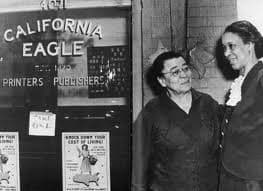
Running a Newspaper
Her first challenge as editor and publisher was to put the newspaper on sound financial footing. She changed the name from The Eagle to The California Eagle and began to expand beyond community service stories. She continually pushed for more news coverage of issues affecting African Americans.
In 1912, she hired a new editor, Joseph Blackburn Bass, a Kansas newspaperman. He, too, was very cause-oriented. The two worked well together and eventually married. (She kept her maiden name of Spears for the first 10 years of their marriage.)
In an early experience with editorial writing, she saw the power of taking a stand. Bass denounced D.W. Griffith’s film, The Birth of a Nation (1915), for its glorification of the Ku Klux Klan and white supremacy. Her voice was soon joined by Black leaders and newspapers throughout the country. This emboldened her to take on more causes that were important to Blacks.
In 1925, the newspaper took on the Ku Klux Klan directly. When one of their reporters obtained a KKK letter outlining the strategy to manipulate the Black vote, The California Eagle did not hesitate to publish it. The KKK sued for libel, but Bass eventually won in court.
Learning More About Publishing
In 1926-27, Bass moved to New York to take some journalism classes at Columbia University. When she returned, she created a new editorial column, “On the Sidewalk,” and began to strengthen her voice.
By the mid-1930s, Bass had the newspaper she dreamed of. She built The California Eagle into a paper that took important editorial stands and was able to keep it on solid financial ground. The newspaper’s circulation of 60,000 made it the largest African American paper on the West Coast.
Death of Husband Led to More Activism
In 1934, Joseph Bass died unexpectedly. He was a strong editor, and this change made Bass re-evaluate her situation. While the newspaper was still her priority, she also wanted to expand into community activism. She participated in the NAACP, the Urban League, the Civil Rights Congress, the Universal Negro Improvement Association, and founded the National Sojourner for Truth and Justice Club (to improve working conditions for black women). She was also the first Black to serve on a Grand Jury in Los Angeles.
Her activities on the national level brought her in contact with people like Paul Robeson and W.E.B. DuBois.
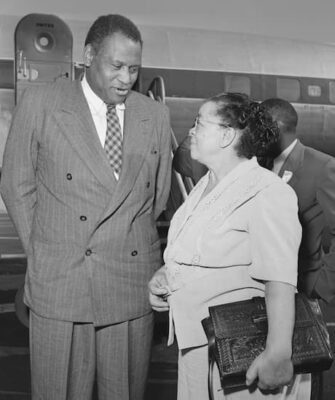
In 1945, Charlotta Bass ran unsuccessfully for a seat on Los Angeles City Council. Then in 1950, she was the Progressive Party’s candidate for state senate. She didn’t win that race either, but both campaigns gave her a platform to talk about issues that were important to African Americans.
First Black Woman to Run for Vice President
Before Kamala Harris, there was Charlotta Spears Bass.
In 1951, after almost 40 years at The California Eagle, Bass sold the newspaper and began to prepare for a run as vice president on the Progressive Party ticket. She was the first Black woman to run for vice president, preceding Kamala Harris. The presidential candidate was Vincent Hallinan, a white attorney from San Francisco.
Hallinan and Bass had few hopes of winning, but she campaigned with the motto: “Win or lose, we win by raising the issues.”
The political spotlight brought Bass to the attention of men like Senator Joseph R. McCarthy. He and others attempted to hunt down communists, so Bass was placed under surveillance by the FBI.
In 1950, she was called before the California Legislature’s Joint Fact-Finding Committee on Un-American Activities. They never found fault with Bass or with her newspaper, but she was subjected to surveillance for the rest of her life.
Later Years
In 1960, she moved to Lake Elsinore, a popular resort for African Americans in Southern California. Charlotta Bass was always there to help others, so she converted her garage into a community center and reading room. She also continued to hold regular voter registration drives and fought for prisoners’ rights.
In 1966 Charlotta Spears Bass suffered a stroke, and never fully recovered. She died three years later.
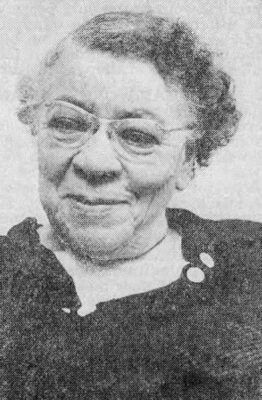
Her Importance
Bass summed up her life by describing her calling: “In public, in private, wherever I have heard the challenge, the call for a greater effort, the need for further struggle…I have continued to this day to work and fight and struggle toward the light of a better day.”

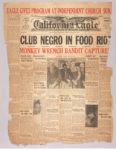
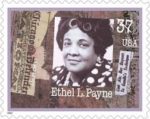
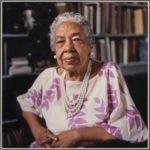
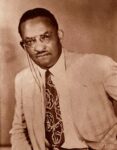
Pingback: The California Eagle: A Newspaper for a Black Readership That Was Ahead of Its Time - America Comes Alive
Pingback: Way Black Then: 137 Years and the Mainstream Black Media Still A Hard-Hitting Voice on the Same Issues | Urban Intellectuals
Pingback: Looking Back: Charlotta Spears, the first Black female VP candidate - Culturas